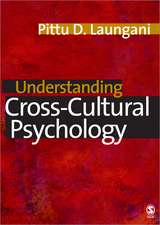Psychological Processes in International Negotiations: Theoretical and Practical Perspectives
Autor Francesco Aquilar, Mauro Galluccioen Limba Engleză Hardback – 10 oct 2007
Now, a unique collaboration between experts in cognitive psychotherapy and political science, Psychological Processes in International Negotiations provides such a resource. Drawing on a wide range of theory and data, from neuroscientific findings and historical events to Albert Ellis’ rational-emotive model of behavior, the book explains how the negotiation process works, under both adverse and optimum conditions. The authors identify psychological elements (in participants and in negotiators themselves) that have the greatest effect on negotiation outcomes, including group identity and groupthink, egocentrism, emotional awareness and competence, and the various interpersonal and communication skills, as well as steps readers can take to improve their performance. With this book, negotiators have the tools to come to clear judgments and creative, non-aggressive solutions.
Highlights of the coverage: Cognition and emotion in the context of negotiation; Characteristics/traits of successful, proactive negotiators; Cognitive views of war and international crisis; Meta-communications and the working relationship; Emotive keys to coping with stalemates; Summaries of a 15-session cognitive/emotional training program for negotiators, and the proposed European Cognitive School of International Negotiation; “Practical guide” ections linking theoretical and practical material.
This synthesis of scientific insights and real-world applications makes Psychological Processes in International Negotiations necessary reading for negotiators, mediators, and conflict managers, as well as for students and researchers in thisfield. The authors’ premise is clear: peace and stability create winners on all sides.
| Toate formatele și edițiile | Preț | Express |
|---|---|---|
| Paperback (1) | 382.18 lei 6-8 săpt. | |
| Springer – 29 oct 2010 | 382.18 lei 6-8 săpt. | |
| Hardback (1) | 389.49 lei 6-8 săpt. | |
| Springer – 10 oct 2007 | 389.49 lei 6-8 săpt. |
Preț: 389.49 lei
Nou
Puncte Express: 584
Preț estimativ în valută:
74.55€ • 81.01$ • 62.66£
74.55€ • 81.01$ • 62.66£
Carte tipărită la comandă
Livrare economică 21 aprilie-05 mai
Preluare comenzi: 021 569.72.76
Specificații
ISBN-13: 9780387713786
ISBN-10: 0387713786
Pagini: 171
Ilustrații: XX, 172 p.
Dimensiuni: 156 x 235 x 13 mm
Greutate: 0.45 kg
Ediția:2008
Editura: Springer
Colecția Springer
Locul publicării:New York, NY, United States
ISBN-10: 0387713786
Pagini: 171
Ilustrații: XX, 172 p.
Dimensiuni: 156 x 235 x 13 mm
Greutate: 0.45 kg
Ediția:2008
Editura: Springer
Colecția Springer
Locul publicării:New York, NY, United States
Public țintă
ResearchCuprins
Introduction: Theoretical and Psychological Aspects of International Negotiation.- Peace Psychology, War Prevention: Coping with Psychological Elements.- Cognitive, Emotional, and Communicative Aspects in International Negotiation: Affective Neuroscience Contribution to the General Understanding of the Negotiation Process.- Emotional Competence in International Negotiation and Mediation Practice.- Addressing Cognition and Emotion in Negotiation and Co-Mediation Practice: A Research Project.- What Psychotherapy Has Done and Can Offer for International Negotiation and Mediation.- Further Directions: Toward a Cognitive-Oriented Post-Graduate School of Negotiation and Mediation.- Practice and Exercises for Negotiators and Mediators.- Features of a Training Program Organised in 15 Meetings; Frontal/Face to Face Lessons, Art-Therapeutic Techniques, Microanalysis of Negotiation Sequences, Emotional and Metacognitive Awareness, Overcoming of Egocentrism, and Renarration of Experience.- Conclusion.
Recenzii
From the reviews:
"Aquilar and Galluccio present a broad range of theoretical perspectives related to the negotiators and the collaborative process … . The intended audience is laypeople interested in exploring psychological and political topics related to negotiation in a culturally rich environment. … It is also intended for those in the fields of psychology, international relations, and professional negotiations … . Psychological Processes in International Negotiations is timely, as today we are all more fully aware of the global society within which we live." (Scott W. Brown, PsycCRITIQUES, Vol. 53 (24), 2008)
"Aquilar and Galluccio present a broad range of theoretical perspectives related to the negotiators and the collaborative process … . The intended audience is laypeople interested in exploring psychological and political topics related to negotiation in a culturally rich environment. … It is also intended for those in the fields of psychology, international relations, and professional negotiations … . Psychological Processes in International Negotiations is timely, as today we are all more fully aware of the global society within which we live." (Scott W. Brown, PsycCRITIQUES, Vol. 53 (24), 2008)
Notă biografică
Dr. Francesco Aquilar, Psych.D. (Psy.D.) is the head of the SPC (School of Specialization in Cognitive Behavioural Psychotherapy of Naples, Italy). He is also a lecturer of Cognitive Psychotherapy and lecturer of Sexuology. He is member of the Governing Body of the EABCT (European Association of Behavioural and Cognitive Therapy) since 1994. He has written and edited 8 books on psychological subjects published in Italian.
Dr. Mauro Galluccio is a political scientist with a strong background on cognitive psychology and psychotherapy, specialized in International Politics and works as a coordination officer at the DG for International Development and relations with African, Caribbean and Pacific States at the European Commission of the European Union. Additionally, Dr. Galluccio is responsible for leading a study group focused on the Psychology of Politics for the Centre of Cognitive Psychology and Psychotherapy of Naples, Italy. Dr. Galluccio has also been a political analyst and adviser to Members of the European Parliament as Director and supervisor of political cabinet teams, specialized in International and European Affairs.
Dr. Mauro Galluccio is a political scientist with a strong background on cognitive psychology and psychotherapy, specialized in International Politics and works as a coordination officer at the DG for International Development and relations with African, Caribbean and Pacific States at the European Commission of the European Union. Additionally, Dr. Galluccio is responsible for leading a study group focused on the Psychology of Politics for the Centre of Cognitive Psychology and Psychotherapy of Naples, Italy. Dr. Galluccio has also been a political analyst and adviser to Members of the European Parliament as Director and supervisor of political cabinet teams, specialized in International and European Affairs.
Textul de pe ultima copertă
Global interests are at stake at the treaty table. But personalities on either side can create difficulties apart from the issues. A skilled negotiator needs to be able to defuse the tensions and misperceptions that can derail progress. But there are few resources that offer a combination of psychological knowledge with the skills of persuasion.
Now, a unique collaboration between experts in cognitive psychotherapy and political science, Psychological Processes in International Negotiations provides such a resource. Drawing on a wide range of theory and data, from neuroscientific findings and historical events to Albert Ellis’ rational-emotive model of behavior to attachment and meta-cognitive functions, the book explains how the negotiation process works, under both adverse and optimum conditions. The authors identify psychological elements (in participants and in negotiators themselves) that have the greatest effect on negotiation outcomes, including group identity and groupthink, egocentrism, emotional awareness and competence, and the various interpersonal and communication skills, as well as steps readers can take to improve their performance. With this book, negotiators have the tools to come to clear judgments and creative, non-aggressive solutions.
Highlights of the coverage:
Now, a unique collaboration between experts in cognitive psychotherapy and political science, Psychological Processes in International Negotiations provides such a resource. Drawing on a wide range of theory and data, from neuroscientific findings and historical events to Albert Ellis’ rational-emotive model of behavior to attachment and meta-cognitive functions, the book explains how the negotiation process works, under both adverse and optimum conditions. The authors identify psychological elements (in participants and in negotiators themselves) that have the greatest effect on negotiation outcomes, including group identity and groupthink, egocentrism, emotional awareness and competence, and the various interpersonal and communication skills, as well as steps readers can take to improve their performance. With this book, negotiators have the tools to come to clear judgments and creative, non-aggressive solutions.
Highlights of the coverage:
- Cognition and emotion in the context of negotiation.
- Characteristics/traits of successful, proactive negotiators.
- Cognitive views of war and international crisis.
- Meta-communications and the working relationship.
- Emotive keys to coping with stalemates.
- Summaries of a 15-session cognitive/emotional training program for negotiators, and the proposed European Cognitive School of International Negotiation.
- "Practical guide" sections linking theoretical and practicalmaterial.
Caracteristici
Authors are highly respected international experts in the field Authors bring together the disciplines of psychology and international negotiation Emphasizes the value of human psychology in the process of negotiation and mediation Facilitates the recognition of potential disputes before they occur in order to prevent them Presents a framework for psychologically proactive negotiations Highlights mental traps and habits to avoid in negotiations














